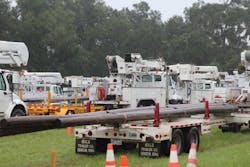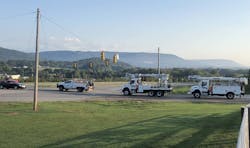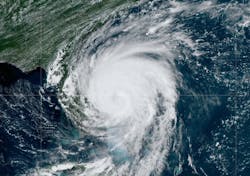Co-Ops in the Southeast Prepare for Hurricane Dorian
Hurricane Dorian, a deadly and dangerous storm that stalled for more than 24 hours over the Bahamas, is slowly lumbering north and threatening the Atlantic coastline of the United States with strong, gusty winds, pelting rain, and surging waves. The massive weather system has electric cooperatives from Florida to Virginia in full preparation mode.
Most forecasts predict that the eye of the hurricane — and its most intense winds — will remain offshore. But with Dorian hugging the coastline, "life-threatening storm surge and dangerous hurricane-force winds are expected along portions of the Florida east coast and the coasts of Georgia and South Carolina, regardless of the exact track of Dorian’s center," according to the National Hurricane Center.
"Hurricane Dorian is forecast to move northwest with an eventual eastern turn that keeps it just off Florida’s coast," said Jim Duncan, CEO of Sumterville, Florida-based SECO Energy, who urged members to take the storm threat seriously.
"Members who live in homes or areas that are subject to flooding, suggested to evacuate, or need guaranteed power to sustain life should check in at a shelter," Duncan said. "If conditions deteriorate, emergency personnel may be grounded and unable to help until the storm passes."
SECO has commitments from 800 mutual aid and contract line crew and vegetation management personnel to assist with restoration, if they are needed. Many of the personnel from seven states are already in the region or are expected to arrive soon.
A Serious Threat
Dorian, which struck Grand Bahama Island as a Category 5 hurricane over Labor Day weekend, shifted just 40 miles in 24 hours. Sustained winds over the Bahamas were clocked at 185 mph with gusts to 220 mph in the hours after landfall.
Dorian has been downgraded to a Category 2 storm, with sustained winds of 110 mph, and is still extremely dangerous. The known death toll in the Bahamas, where some communities have been inundated with storm surge topping 20 ft, is five, but search and rescue efforts are just beginning.
Further strengthening is possible as the storm moves back over open water, particularly as it encounters warmer water and atmospheric conditions from the Gulf Stream.
U.S. East Coast on High Alert
Mandatory evacuations are in full swing in some coastal and low-lying, flood-prone areas in parts of Florida, Georgia, and the Carolinas. Residents and visitors are streaming out on evacuation routes where lanes in some areas have been reversed to handle more volume, even as vehicles filled with utility crews head toward staging areas near coastal communities.
Convoys of bucket trucks, digger derricks, and crew support vehicles from co-ops, other utilities, and power line and tree trimming contractors covered hundreds of miles throughout the holiday weekend.
"Lineworkers have a desire to serve others," says David Callis, executive vice president and general manager of the Tennessee Electric Cooperative Association. "It always impresses me how quickly our crews volunteer to help, even without knowing the conditions they will face or how long they will be away from their families."
Co-ops in the threatened region continue accepting and dividing shipments of the poles and parts needed to conduct major restoration operations and keep visiting crews moving through storm-ravaged communities.
"We're bringing in truckloads of poles and pre-staging two additional overhead contract line crews to join the ones we already have," said Mark Bolton, vice president of communications at Midway, Georgia-based Coastal Electric Membership Corp.
"It's not possible to estimate the impact to the electric infrastructure at this time," said Harry Reeves, vice president of training, education and safety with Georgia Electric Membership Corp. "We've used our time wisely, and since last week, all electric membership cooperatives (EMCs) have been working from their proven storm response plans and are taking the necessary steps to prepare for any eventuality."
In South Carolina, governor Henry McMaster ordered a mandatory evacuation of coastal communities in the state’s low country region.
"We're preparing for the worst and urge members to do the same," said Penelope Hinson, manager of public relations, marketing, and energy management at Conway, South Carolina-based Horry Electric Cooperative. "If you depend on electric service for medical reasons or for life support, please make arrangements to evacuate to a location that is a safe distance from here and is not at risk of losing electric power."
North Carolina governor Roy Cooper followed Florida, Georgia, and South Carolina in declaring a state of emergency, and the state’s coastal counties opened shelters. Mandatory evacuations were ordered for visitors to North Carolina’s Dare County resorts and residents of some coastal communities were expected to evacuate soon.
"Even though the forecast is uncertain of the exact track Hurricane Dorian will take, we want to encourage and remind everyone to be prepared," said Jeremy Dewberry, a communications specialist at Burgaw, North Carolina-based Four County Electric Membership Corp.
Co-op officials have assured members that crews and equipment have been positioned to respond to outages wherever they occur, but they caution that rebuilding electrical systems hit by catastrophic damage is a slow, tedious, and deliberate process.
"Our state has seen its share of destructive hurricanes during the last few years and cooperative line crews are storm-tested," said Nelle Hotchkiss, senior vice president and chief operating officer of association services for North Carolina’s Electric Cooperatives. "They are highly trained, highly experienced and committed to restoring power to members as quickly as is safely possible."
National Preparedness
The threat of Dorian has prompted a national response mobilizing co-ops, other utilities, state and federal agencies, and industry associations involved in operations, maintenance, and oversight of the power grid and its infrastructure.
Crews from at least 36 states, the District of Columbia, and Canada have been offered, and all pre-staging resource needs have been met, officials from the Electric Subsector Coordinating Council said. Contract and mutual aid crews were prepared to reposition to respond to projected storm track changes.
"We are prepared to respond to extended outages around the clock as soon as it is safe to do so," said National Rural Electric Cooperative Association CEO Jim Matheson. "As the storm track continues to shift, we are praying for the best and preparing for the worst."



